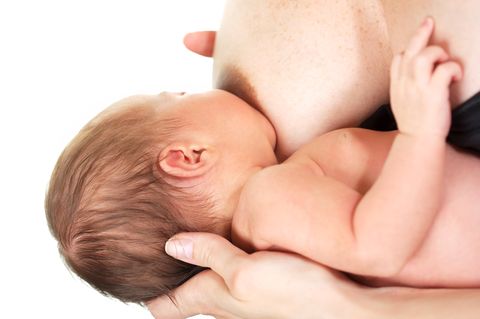Foods to Avoid While Breastfeeding
Your baby’s tolerance to the specific food will change as he/she gets older and as Baby's system matures. ONLY IF your baby has tested positive for a food allergy, it is best to delay giving the problem food to your baby before 12 months.

Is There a List of Foods to Avoid While Breastfeeding?
Most foods are safe to eat while breastfeeding. A mother only needs to start looking at her diet for culprit foods after considering other reasons her baby might be cranky.
Have a look at the breastfeeding a fussy infant page to find out whether you should change your diet or change something else.
Other possible reasons for colic symptoms in your baby.
If you think that it is the food in your diet that is causing discomfort in your baby, you should get allergy tests done before trying an elimination diet.
It may take up to two weeks before your system is cleared of the food you have eliminated from your diet. Suppose the gassiness, fussiness, and crying do not ease with specific food elimination. In that case, you can rest assured that most babies will stop experiencing these problems from about three months onward.
The fussiness, if caused by your breast milk, is usually the result of something eaten three to six hours before; this will give you an idea of what could be causing the problem.
Your baby’s tolerance to the specific food will change as they get older and as your baby's system matures. ONLY IF your baby has tested positive for a food allergy is delaying giving the problem food to your baby before 12 months best. After this period, you can start giving your child small amounts of the culprit food.

Those That Every Breastfeeding Mom Should Stay Away From
- Shark, Swordfish, Tilefish, and King Mackerel are the most important foods to avoid while breastfeeding. (These fish contain a high mercury content).
- Tuna. (No more than one tuna steak or two 170g cans a week).
- All freshwater fish from contaminated areas. More about eating fish while breastfeeding.
- Stay away from artificial sweeteners like Saccharin.
- Stay away from processed foods; they contain too many additives.
- Alcohol is allowed in small amounts—more about drinking alcohol while breastfeeding.
- The extra fat on meat should be cut off because it absorbs toxins.
- Coffee (limit to two cups a day)—more about breastfeeding and caffeine intake.
Foods That May Cause Your Baby Discomfort
It was believed that avoiding common food allergens (any substance that can cause an allergy) would decrease the risk of a baby developing allergic reactions. It was also believed that if the mother or close family had an allergic reaction to a specific food, that food should be avoided while breastfeeding. BUT...Recent research suggests that introducing culprit foods into your baby's diet in small amounts from 4 months can prevent allergic reactions later. A mother is now encouraged to eat these foods during pregnancy and breastfeeding unless she is allergic to a specific food. Reference for this new information: Allergies - Where are we now?

Tushbaby Hip Carrier
With its ergonomic design and comfortable waistband, Tushbaby provides optimal support for both you and your baby, allowing for bonding on the go. Say goodbye to shoulder and back pain from traditional carriers, as Tushbaby evenly distributes your baby's weight, relieving strain and promoting better posture.
Some Common Culprit Foods Include:
Beans, Cabbage, Cherries, Corn, Dairy products, Garlic, Onions, Shellfish, Tomato, Broccoli, Caffeine, Chocolate, Corn syrup, Eggs, Hot peppers, Peanuts, Soy, tofu, Wheat, Brussel sprouts, Cauliflower, Citrus fruits and juices, Cucumber, Food dyes, Iron and other supplements and medication, Prunes, and Spicy food.
Signs That You Need to Get Your Baby Tested
Signs That Your Breastfed Baby Is Allergic to Something in Your Diet
- Extra fussiness.
- Constipation or diarrhea.
- Abdominal bloating and gas.
- Excessive spitting up.
- Colic symptoms.
- Diaper rash.
- Runny nose.
- Eczema.
More about how to handle food sensitivities in the breastfed infant.
If you are going to be eliminating something like dairy from your diet, you will need to see a dietitian so that they can help balance your diet; also, remember to keep on taking your vitamins.
